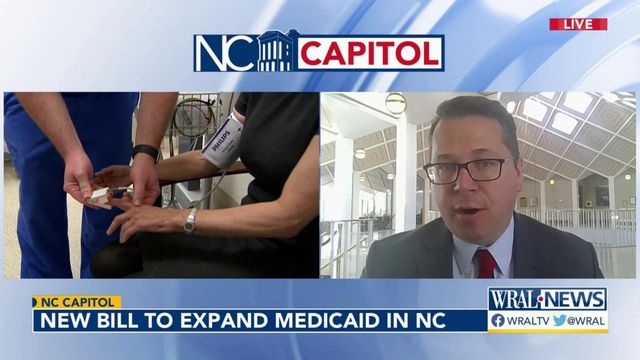Once controversial, Medicaid expansion moves on greased tracks at NC legislature
Top legislative leaders announced a deal on the program last week, saying North Carolina would become the nation's 40th expansion state by pairing the program with long-debated rollback's in the state's robust hospital regulations.
Posted — UpdatedA once-controversial, multibillion-dollar bill to expand taxpayer-funded health insurance to hundreds of thousands of people in North Carolina flew through a key Senate committee Tuesday with little discussion and no opposition.
Things have changed on Medicaid expansion, an issue that had divided North Carolina’s General Assembly longer than most of its members have been elected.
All of this is in House Bill 76, which passed the Senate Health Committee Tuesday. The bill is expected to roll through two more Senate committees this week and be on the chamber floor early next week. From there it heads to the House, where quick passage is expected, and to Gov. Roy Cooper to sign into law.
Expansion itself, which for the first time would put able-bodied adults making up to 138% of the federal poverty level on the state’s Medicaid rolls, wouldn’t take effect until the state also enacts a new budget. Cooper, a Democrat who has pushed expansion his entire time in office, has called on Republican lawmakers who newly support the program to move faster, saying the state forfeits more than $500 million in federal funding each month it delays.
Sen. Ralph Hise, R-Mitchell, is a Senate leader on healthcare issues. He said Tuesday that it will likely take about 90 days for the federal government to approve North Carolina’s expansion proposal anyway, so there’s time to wait on the budget. Republican budget-writers are all but certain to add items to that budget, though, that Cooper and other Democrats don’t like, forcing them to swallow GOP proposals if they want to see expansion become law.
The federal government would pay 90% of expansion costs, which amounts to billions of dollars a year. Most of the state’s 10% match would be covered by additional federal funding through the Healthcare Access and Stabilization Program.
If the federal match falls below 90%, expansion would end in North Carolina under this bill, removing people from the insurance rolls.
The bill’s certificate-of-need reforms were hard-fought, with hospitals in the state pushing back against reforms. In the end, Senate Republicans who pressed these changes say they amount to a major overhaul in regulations that have been some of the nation’s strictest rules.
Right now state approval is required to add psychiatric or chemical dependency treatment beds to a facility, or to build a new facility. Those rules would be dropped under this bill, opening this category of treatment to more competition.
Adding MRI machines or opening an ambulatory surgical center would still require state approval in rural counties, but that approval wouldn’t be required in counties with populations over 125,000. That change would go into effect about two years from now for surgical centers and three years from now for MRI’s.
The bill also boosts financial thresholds that trigger certificate-of-need approvals. Right now adding or replacing diagnostic center equipment that costs more than $2 million requires approval. This bill ups that to $3 million and indexes the threshold to inflation going forward.
The bill also includes reforms to the state’s workforce development programs, an offshoot of efforts to connect expansion eligibility with job requirements. The federal courts have said that’s not allowed, stymying a GOP proposal on this issue. But the bill still requires the state’s Department of Commerce to build a “seamless, statewide, comprehensive workforce development program,” combining existing programs and working with other state agencies.
This bill moved forward Tuesday with just a handful of questions from Senate Health Committee members. The committee room was crowded, but with the tracks greased, only one member of the public spoke: Peg O’Connell, who chairs Care4Carolina, a coalition of more than 170 groups that back expansion.
“This is an important day for the people of North Carolina,” O’Connell said. “If my face looks like it’s going to break from smiling too much, it is.”
State Rep. Donny Lambeth, a Republican lawmaker who backed expansion for years before his colleagues got on board, said after the committee vote that people will look back on this decision in five years and “realize how much of a difference this made” in people’s lives.
“This really is a monumental day,” said Lambeth, R-Forsyth.
As the committee wrapped, there was some regret for provisions that got cut from the bill as the compromise moved forward. In addition to certificate of need reforms, Republican state senators once demanded changes in North Carolina nursing laws that would give advanced practice registered nurses more authority to work without a doctor’s supervision.
“Still need to pass the SAVE Act,” Hise said as the committee finished its day and lawmakers congratulated each other on expansion moving forward.
“I second that,” replied Sen. Gale Adcock, a nurse by trade.
Related Topics
• Credits
Copyright 2024 by Capitol Broadcasting Company. All rights reserved. This material may not be published, broadcast, rewritten or redistributed.






